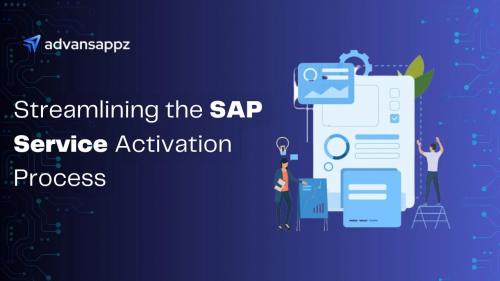Streamlining the SAP Service Activation Process

Streamlining the SAP Service Activation Process
In the ever-evolving landscape of business operations and technology, SAP (Systems, Applications, and Products) plays a pivotal role in managing and optimizing various aspects of an organization. However, one crucial aspect that often poses challenges for businesses is the activation process of SAP services. In this article, we will delve into the intricacies of streamlining the SAP service activation process to ensure a smoother and more efficient experience for businesses.
1. Introduction
SAP, a leading provider of enterprise software, offers a multitude of services that empower organizations to manage their business processes efficiently. However, the process of activating these services has often been marred by complexity and inefficiency. In this article, we will explore the challenges associated with SAP service activation and provide strategies for streamlining the process.
2. Understanding SAP Service Activation
Before delving into the challenges and solutions, it's crucial to understand what SAP service activation entails. When an organization acquires an SAP service, such as SAP S/4HANA or SAP Business Intelligence, they need to activate and configure it to suit their specific requirements. This process involves a series of steps, from licensing and provisioning to customization.
3. Challenges Faced
3.1 Complexity and Lengthy Procedures
One of the primary challenges in SAP service activation is the intricate and time-consuming procedures involved. Often, businesses find themselves lost in a maze of documentation and technical requirements, leading to delays in activation.
3.2 Communication Gaps
In large organizations, communication gaps between IT teams, SAP consultants, and business units can hinder the activation process. Miscommunication can lead to errors and setbacks.
3.3 Compliance Issues
Ensuring compliance with licensing agreements and regulatory requirements is a critical aspect of SAP service activation. Non-compliance can lead to legal complications and financial penalties.
4. Streamlining Strategies
To overcome the challenges of SAP service activation, businesses can adopt the following strategies:
4.1 Automation of Activation Processes
Automation can significantly reduce the complexity and duration of activation procedures. Implementing automated workflows can streamline repetitive tasks and ensure accuracy.
4.2 Clear Documentation and Training
Providing clear and concise documentation along with training sessions for relevant teams can demystify the activation process. This empowers employees to navigate the process smoothly.
4.3 Enhanced Communication Channels
Establishing effective communication channels between IT teams, SAP consultants, and business units is essential. Regular meetings and status updates can bridge communication gaps.
5. Benefits of Streamlining
Streamlining the SAP service activation process offers several benefits, including:
Reduced activation time
Cost savings through automation
Enhanced compliance and risk mitigation
Improved collaboration among teams
Faster realization of ROI on SAP investments
6. Case Study: Successful Implementation
Let's examine a real-world example of a company that successfully streamlined its SAP service activation process, resulting in improved efficiency and productivity.
7. Future Trends
The world of SAP is constantly evolving. We will explore the future trends in SAP service activation, including AI-driven automation and enhanced user experiences.
8. Conclusion
Streamlining the SAP service activation process is essential for organizations looking to leverage SAP's capabilities effectively. By addressing complexity, improving communication, and embracing automation, businesses can ensure a seamless activation experience.
Access Now: advansappz
In conclusion, streamlining the SAP service activation process is not just a matter of convenience; it's a strategic imperative for businesses aiming to stay competitive in today's fast-paced digital landscape. By embracing automation, improving communication, and ensuring compliance, organizations can unlock the full potential of SAP services and drive their growth and success.
Post Your Ad Here
Comments